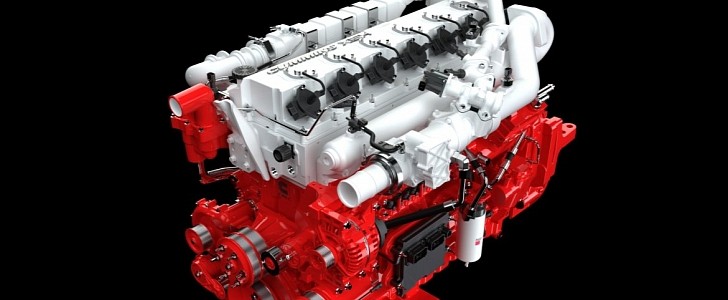Cummins made clear its hydrogen ambitions last year when it announced the development of hydrogen-fueled combustion engines. We found out that Cummins was working on adapting the combustion chambers and cylinder heads for optimized hydrogen burning. Soon, the engine behemoth unveiled the concept of a fuel-agnostic engine platform, able to burn any fuel with minor modifications. Now, Cummins is ready with a production version of a 15-liter hydrogen-fueled engine.
The ever more stringent environmental regulations have pushed vehicle manufacturers to look for solutions to cut greenhouse gases (GHG). Electric vehicles look promising for consumer applications, but heavy-duty scenarios require a more adequate solution. That’s where the hydrogen might prove useful, either by using it in fuel cells to produce electricity or by burning it directly in an internal combustion engine.
Cummins has decided to go all-in with hydrogen and started development with fuel-cell-powered vehicles as well as hydrogen-powered internal combustion engines. The latter is said to be a drop-in replacement for diesel and gas engines, requiring only minor modifications to run on hydrogen. Cummins being so far ahead in the internal combustion game naturally favors the hydrogen-powered ICEs. Its fuel-agnostic engine platform provides plenty of flexibility, allowing Cummins to move fast toward the first commercially-available hydrogen engine.
The 15-liter version of the hydrogen engine that Cummins debuted at ACT Expo in Long Beach, California will be ready for mass production in 2027. A smaller, 6.7-liter version of this engine will also be available soon, enabling the industry to reduce the GHG emission “yet this decade”. The two engines are built upon Cummins’ fuel-agnostic platform, where below the head gasket the engines have largely similar components, and above the head gasket, each has different components for different fuel types.
“Our customers are responding favorably to this practical technology,” said Jim Nebergall, General Manager, Hydrogen Engines at Cummins. “These engines look like engines, they sound like engines, and fit where engines normally fit.”
Advances in hydrogen generation mean greener, more affordable hydrogen will soon become available to the transportation companies. This development will allow the industry to choose whatever technology suits them on the path to decarbonization, without worrying about costs.
Cummins has decided to go all-in with hydrogen and started development with fuel-cell-powered vehicles as well as hydrogen-powered internal combustion engines. The latter is said to be a drop-in replacement for diesel and gas engines, requiring only minor modifications to run on hydrogen. Cummins being so far ahead in the internal combustion game naturally favors the hydrogen-powered ICEs. Its fuel-agnostic engine platform provides plenty of flexibility, allowing Cummins to move fast toward the first commercially-available hydrogen engine.
The 15-liter version of the hydrogen engine that Cummins debuted at ACT Expo in Long Beach, California will be ready for mass production in 2027. A smaller, 6.7-liter version of this engine will also be available soon, enabling the industry to reduce the GHG emission “yet this decade”. The two engines are built upon Cummins’ fuel-agnostic platform, where below the head gasket the engines have largely similar components, and above the head gasket, each has different components for different fuel types.
“Our customers are responding favorably to this practical technology,” said Jim Nebergall, General Manager, Hydrogen Engines at Cummins. “These engines look like engines, they sound like engines, and fit where engines normally fit.”
Advances in hydrogen generation mean greener, more affordable hydrogen will soon become available to the transportation companies. This development will allow the industry to choose whatever technology suits them on the path to decarbonization, without worrying about costs.







